|
 Hohenbuehelia petalodes Hohenbuehelia petalodes
SynonymsHohenbuehelia parsonsiae
Agaricus petalodes
BiostatusPresent in region - Exotic
Images (click to enlarge)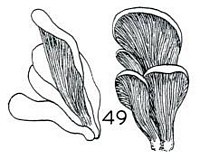
Caption: Fig. 49 | 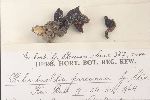
Caption: Image from type, Kew
Owner: B.P. Segedin | 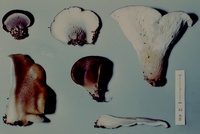
Caption: ZT68-024
Owner: E. Horak: © Creative Commons Attribution-Noncommercial 3.0 New Zealand | 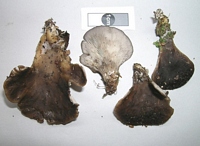
Owner: J.A. Cooper | 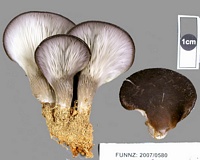
Owner: J.A. Cooper | 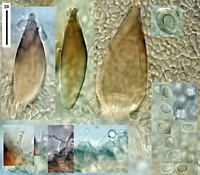
Caption: metuloid pleuro/cheilocystidia. 'Nematode' cheilocystidia, spores and basidia.
Owner: J.A. Cooper | 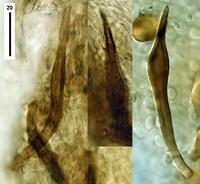
Caption: pilocystidia
Owner: J.A. Cooper | 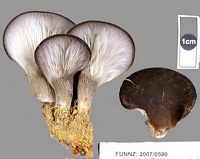
Caption: FUNNZ2007/0580
Owner: FUNNZ | 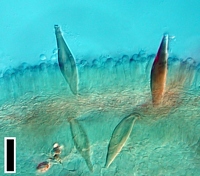
Caption: metuloid cystidia in gills. Scale = 20um.
Owner: J.A. Cooper | 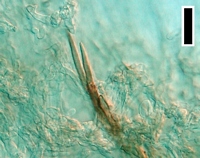
Caption: cap cystidia embedded in gelatinous matrix. Scale = 20um
Owner: J.A. Cooper | 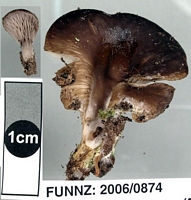
Caption: Col. DA0487, FUNNZ: 2006/0874, See public note for more information
Owner: FUNNZ | 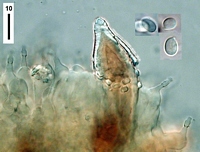
Caption: Col. DA0487, FUNNZ: 2006/0874, See public note for more information
Owner: FUNNZ | 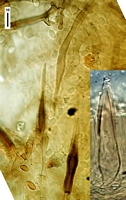
Caption: Col. DA0487, FUNNZ: 2006/0874, See public note for more information
Owner: FUNNZ |
Article: Stevenson, G. (1964). The Agaricales of New Zealand: V. Kew Bulletin 19(1): 1-59.
Description: Pileus 3-6 x 2-4 cm, deep reddish brown, spathulate with down-rolled margin, somewhat striate at first, smooth; flesh concolorous. Gills deeply decurrent, fawn to ochraceous, deep, moderately crowded. Stipe 0.5 x 0.5 cm, lateral, concolorous, solid, fleshy, uniting in groups. Spores 7 x 5 µm, non-amyloid, thin-walled. Metuloids 50 x 15 µm, pseudo-amyloid, very thick-walled encrusted with crystals, very abundant on gill faces (Fig. 1/491 P.10)-Cuticle subregular, with occasional thick-walled hyphae with sharp pointed hyphal endings.
Habitat: In humus soil or on fallen wood, Levin, 25.7-1948, G. Parsons in Stevenson (type); Otari, 7.6.1958, Stevenson.
Article: Horak, E. (1971). A contribution towards the revision of the Agaricales (Fungi) from New Zealand. New Zealand Journal of Botany 9(3): 403-462 (http://www.rsnz.org/publish/abstracts.php).
Notes: Hohenbuehelia parsonsii Stevenson (29 D) = Hohenbuehelia petaloides (Fries)
Schulzer
This species may be introduced as it is frequently found on ruderal places or in
lawns.
|